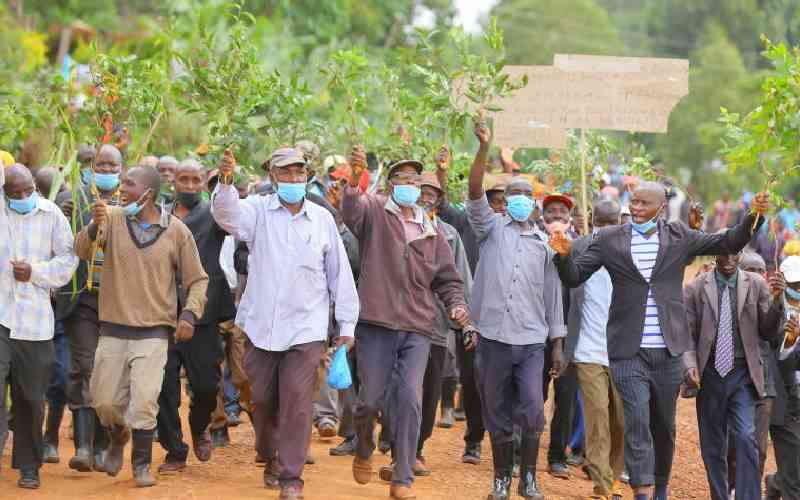Kenya’s first woman professor, Leah Marangu, also the longest serving university vice chancellor in Kenya, radiates warmth and charm as she confidently ambles her way through the challenging terrain in academia.
She says looking at the people she has mentored over the years fills her with satisfaction of a job she says came her way accidentally after she abandoned nursing.
The ambiance in her office and boardroom at the Africa Nazarene University on the outskirts of Nairobi, an institution she helped midwife in the 1990s and has headed for 15 years as vice chancellor, speaks of her dedication to churning out responsible graduates.
A painting on the boardroom wall depicts a lioness standing over her cubs, an image that perhaps best captures the professor’s lofty achievements as an educator per excellence.
Prof Marangu explains: “That painting was done at Kenyatta University in appreciation of my mentorship. I am the lioness and among my cubs is Prof Olive Mugenda whom I taught at the university. The other two are also my students, Prof Margaret Kobia, who currently chairs the Public Service Commission of Kenya, and Prof Mary Walingo, the Vice Chancellor of Maasai Mara University.”
Spearheading change
“The painting is only symbolic, not conclusive. My older cubs, many of them products of the Department of Home Economics, which I chaired, include former Masinde Muliro University of Science and Technology (MMUST) Vice Chancellor Asenath Sigot and Kenyatta University Deputy Vice Chancellor for Finance, Planning and Development Keren Mburugu to name a few.”
Outside the academic realm, Marangu is a model on the family front. She is the loving wife of academician turned businessman Prof John Marangu, who she proudly describes as a “wonderful husband”. The couple have four children and four grandchildren. “Success is more pronounced in a stable marriage,” she asserts.
Her accolades include one for leadership in strengthening families and recognising family values. She was among the Global Lifetime Achievers recognised for outstanding work for humanity during the 5th Global Peace Convention in Kuala Lumpur, Malaysia, in December 2013.
Presenting the Global Peace Family Strengthening Award to Marangu, the President of Human rights Teaching International, Eva Latham, remarked: “You cannot divorce academics from family.”
Dr Litham went on to say the don, who has been married for 55 years, had “helped produce better family members during her long academic career and transformed hundreds of her students into responsible family men and women.”
In Mumbai, India, at the World Women Leadership Congress, Marangu was decorated with a Women Leadership Achievement award for outstanding women professionals who have demonstrated vision, flair, acumen and management in an organisation, spearheading change and driving results.
In academics, the VC possesses an international Leadership and Character Award and Distinguished Achievement Citation given by Iowa State University, her alma mater.
Olivet Nazarene University, also her alma mater, awarded her the Outstanding Alumni Lay Award, Maggie Sloan Crawford Award and Doctor of Letters (D.Lit.), all for her exemplary leadership in education and mentorship.
Further studies
Stay informed. Subscribe to our newsletter
Locally, Marangu flaunts the Moran of the Order of the Burning Spear (MBS) and the Silver Star of Kenya (SSK) awarded by former presidents Kibaki and Moi respectively.
The VC was the first woman to head a parastatal when she was appointed to chair the board of directors at the Jomo Kenyatta Foundation. As a member of the Commission of Higher Education (CHE) in the 1990s, she was part of the task force that created Egerton University and its founding council.
She says of the university that she heads: “I contributed to the idea of the formation of Africa Nazarene University by suggesting to CHE during my days as a member that time was ripe for a university based on character for students who did not want frequent interruptions in public universities because of riots.”
“When the commission agreed to the proposal, my husband and I returned to America in 1992 for further studies. Africa Nazarene University started while we were away in 1994; it was the only local university to start without a link to other institutions. We returned two years later and it was suggested that one of us should take over as VC to revamp the institution. I took up the mantle in January 1996 with my husband’s blessings. He opted to go into business.”
Marangu says what today is an attractive complex with modern facilities and a population of more than 4,000 students, was a cluster of makeshift structures surrounded by an expansive jungle teeming with wildlife. She recalls: “I remember an incident in which a lion killed five cows just metres away from the compound. Giraffes, antelopes, zebras and even hyenas often strayed into the compound when lectures were in session.”
“I found 65 students and only three departments - computer science, business administration and theology - in place. Today, we have 13 departments and 39 programmes on offer,” she says.
Marangu was until recently chair of the Character and Creativity Initiative (CCI) approach to education aimed at producing all-round individuals, before she handed over to Prof Mugenda “in the spirit of passing the baton to younger blood”. The initiative has evolved into Leap hubs, the leadership and entrepreneurship hubs in secondary schools, where students are incubated and nurtured to be creative. It was born at Africa Nazarene University.
“What begins here transforms the world,” Marangu was once quoted saying about CCI.
What does the veteran don make of education in Kenya today?
“Education ought not be about memorisation as seems to be the case in Kenya today, but about utilisation of knowledge for improved lives. That is where we have failed. We are also haphazardly starting universities that serve only to mass-produce half-baked graduates who cannot translate what they have learnt into fruitful end products. Unfortunately, that is the path we are treading, hence the relevance of CCI to change the trend,” she says.
Examinations
Marangu says good education does not give students solutions but rather inspires them to look for solutions.
She abhors ‘spoon feeding’ for purposes of passing examinations as evident in many leading schools, and describes the rampant cheating in national exams as a societal evil that must be condemned and defeated at all costs if our qualifications are to be respected.
Born in South Imenti, Meru County, the VC went to Kaaga Girls High School before training as a public health nurse and midwife at the Maua Methodist Hospital. She worked briefly at the Meru and Nkubu hospitals.
Her desire for additional nursing skills overseas, were thwarted when she joined her husband in America only to be denied admission to a nursing school run by the Catholic Church because she was married.
“It was a perfect example of discrimination against women,” she laments.
“I settled for home economics at Olivet Nazarene University where my husband was studying botany. Home economics struck me as the closest option to my beloved nursing because it would enable me raise people’s quality of life by teaching them better nutrition rather than attending to them in hospital. I took solace in the fact that proper nutrition, which home economics is all about, was like preventive medical care, albeit taking longer to produce results,” she says.
“After my home economics undergraduate studies at Olivet Nazarene University, I went to Northern Illinois University for a Master of Science (M.Sc.) degree in home economics education. I did a second M.Sc. in environment and home management at Iowa State University and a doctorate in home economics education at the same university. On our return to Kenya, my husband and I taught at Kenyatta University where he was chairman of the Department of Botany and I was chairman of the Department of Home Economics.”
 The Standard Group Plc is a
multi-media organization with investments in media platforms spanning newspaper
print operations, television, radio broadcasting, digital and online services. The
Standard Group is recognized as a leading multi-media house in Kenya with a key
influence in matters of national and international interest.
The Standard Group Plc is a
multi-media organization with investments in media platforms spanning newspaper
print operations, television, radio broadcasting, digital and online services. The
Standard Group is recognized as a leading multi-media house in Kenya with a key
influence in matters of national and international interest.
 The Standard Group Plc is a
multi-media organization with investments in media platforms spanning newspaper
print operations, television, radio broadcasting, digital and online services. The
Standard Group is recognized as a leading multi-media house in Kenya with a key
influence in matters of national and international interest.
The Standard Group Plc is a
multi-media organization with investments in media platforms spanning newspaper
print operations, television, radio broadcasting, digital and online services. The
Standard Group is recognized as a leading multi-media house in Kenya with a key
influence in matters of national and international interest.









